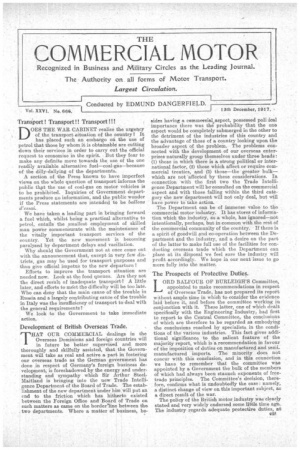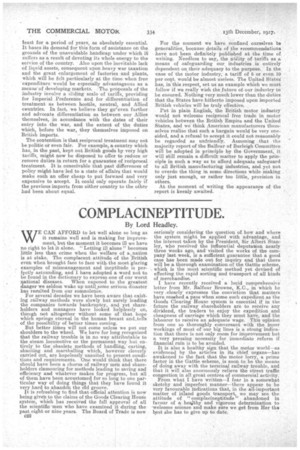Transport! Transport!! Transport!!! '
Page 1

Page 2

If you've noticed an error in this article please click here to report it so we can fix it.
DOES THE. WAR CABINET realise the urgency of the transport situation of the country? It has placed such an embargo on the use of petrol that those by whom it is obtainable are cutting down their services in order to carry out the official request to economise in the spirit. But they fear to make any definite move towards the use of the one readily available alternative fuel—coal-gas—because of the dilly-dallying of the departments.
A section of the Press known to have imperfect views on the whole question of transport informs the public thAt the use of coal-gas on motor vehicles is to be prohibited. Inquiries of Government departments produce no information, and the public wonder if the Press statements are intended to be ballons cresRai. , We have taken a leading part in bringing forward a fuel which, whilst being a practical alternative to petrol, entails the smallest employment of skilled man power commensurate with, the maintenance of the vitally important transport services of the country. Yet the new movement is becoming paralysed by department delays and vacillation.
Why should the Government not at once come out with the announcement that, except in very few districts, gas may be used for transport purposes and thus give official impetus to the new departure I Efforts to improve the transport situation are needed now. Look at the food queues. Are they not the direct result of inadequate transport? A little later, and efforts to meet the difficulty will be too late. Who can deny that the main cause of the trouble in Russia and a largely contributing cause of the trouble in Italy was the insufficiency of transport to deal with the general requirements ?
Development of British Overseas Trade.
THAT OUR COMMERCIAL dealings in the Overseas Dominions and foreign countries will I in future be better supervised and more thoroughly and skilfully assisted, that the Government will take as real and active a part in fostering our overseas trade as the Gernaan government has done in respect of Germany's foreign business development, is foreshadowed by the energy and understanding and sympathy which Sir Arthur SteelMaitland is bringing into the new Trade Intelligence Department of the Board of Trade. The establishment of the new department Under him will put an end to the friction which has hitherto existed between the Foreign Office ancl Board of Trade on such matters as came on the border 'line between the, two departments. Where a matter of business, be sides having a, commercial, aspect, possessed poli Rad importance there was the probability that the one aspect would be completely submerged in the other to the detriment of the industries of this country and the advantage of those of a country looking upon the broader aspect of the problem. The problems connected with the development of our overseas enterprises naturally group themselves under three heads : (1) those in which there is a strong political or international factor, (2) those which affect or require commercial treaties, and (3) those—the greater bulk— which are not "affected by these considerations. In connection with the first two the Trade Intelligence Department will be-consulted on the commercial aspect and with those falling within the third category the new department will not only deal, but will have power to take action.
The Department can be of immense value to the commercial motor industry. It has stores of information which the industry, as a whole, has ignored—not intentionally, perhaps, but in common with the rest of the commercial community of the country. If there is a spirit of goodwill and co-operation between the Department and the industry, and a desire on the part of the latter to make full use of the facilities for con.ducting overseas trade which the Department can place at its disposal we feel sure the industry will profit accordingly. We hope in our next issue to go more fully into the matter.
The Prospects of Protective Duties.
LORD I3ALFOUR OF BURLEIGH'S Committee, appointed to make recommendations in respect of Overseas Trade, has not prepared its report without ample time in which to consider the evidence laid before it, and before the committee working in conjunction with it. These latter, one of which dealt specifically with the Engineering Industry, had first to report to the Central Committee, the conclusions of which are therefore to be regarded as embodying the conclusions reached by specialists in the conditions of the various industries. This fact gives additional significance to the salient feature of the majority report, which is a recommendation in favour of the imposition of duties on manufactured and semimanufactured imports. The minority does not concur with this conclusion, and in this connection we have to remember that the committee was appointed by a Government the bulk of the members of which had always been staunch exponents of freetrade principles. The Committee's decision, therefore, confirms what is undoubtedly the case : namely, a distinct change of view on. this important subject, as a direct result of the war.
The policy of the British motor industry was clearly stated and very widely endorsed some little time ago. The industry regards adequate protective duties, at least for a period of years, as absolutely essential. It bases its demand for this form of assistance on the grounds of the unavoidable handicap under which it suffers as a result of devoting its whole energy to the service of the country. Also upon the inevitable lack of liquid assets, consequent upon heavy war taxation and the great enlargement of factories and plants, which will be felt particularly at the time when free expenditure •would be especially advantageous as a means' of developing markets. The proposals of the industry involve a sliding scale of tariffs, providing for Imperial Preference and for differentiation of treatment as between hostile, neutral, and Allied countries. In fact, we believe they go' even further and advocate differentiation as between our Allies themselves, in accordance with the dates of their entry into the war, and the extent of the duties which, before the war, they themselves imposed on British imports.
The contention is that reciprocal treatment may not be politic or even fair. For example, a country which has, in the past, kept out British go-ods by very high tariffs, might now be disposed to offer to reduce or remove duties in return for a guasantee of reciprocal treatment. It is conceivable that past differences of policy might have led to a state of affairs that would make such an offer cheap to put forward and very expensive to accept. It could only operate fairly if the previous imports from either country to the other had been about equal.
For the moment we have confined ourselves te generalities, because details of the recommendations have not been definitely published at the time of writing. Needless to say, the utility of tariffs as a means of safeguarding our industries is entirely dependent on their adequacy to the purpose. In the case of the motor industry, a tariff of 5 or even 10 per cent. would be almost useless. The United States: has, in this respect, set us an example which we must follow if we really wish the future of our industry to be ensured. Nothing very much. lower than the duties that the States have hitherto imposed upon imported British vehicles will be truly effective.
Put in plain English, the British motor industry would not welcome, reciprocal free trade in motor vehicles between the British Empire and the United States, and we think American manufacturers themselves realise that such a bargain would be very onesided, and a refusal to accept it could not reasonably be regarded as unfriendly. Assuming that the majority report of the Balfour of Burleigh Committee will be adopted in principle by the Governments it will still remain a difficult matter to apply the principle in such a way as to afford adequate safeguard to all British. manufacturing industries, and yet not to overdo the thing in some directions while Making only just enough, or rather too little, provision in others.
At the moment of writing the appearance of the report is keenly awaited.


























